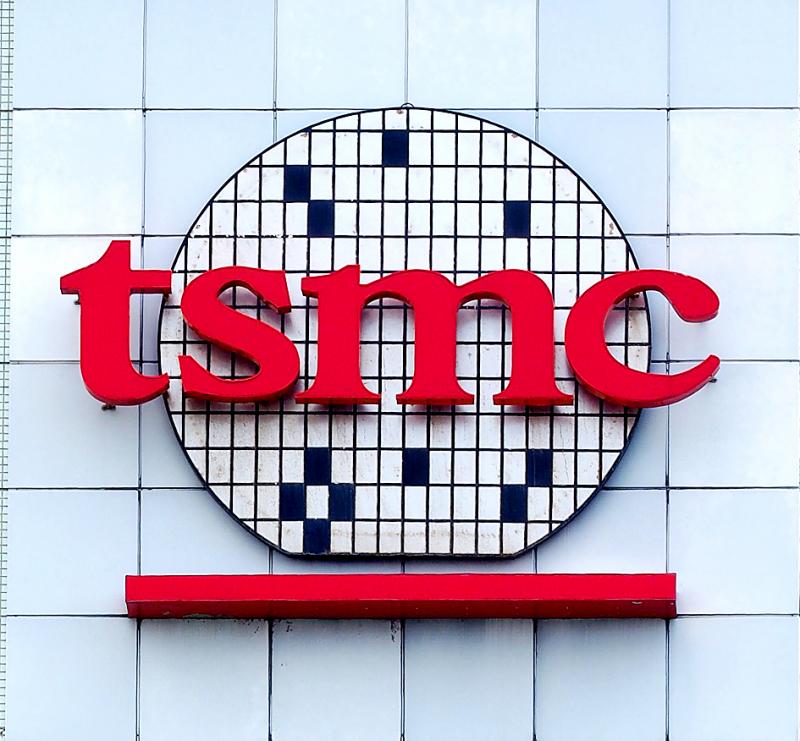Taiwan Semiconductor Manufacturing Co (TSMC, 台積電) has stopped new orders from Huawei Technologies Co (華為) in response to Washington’s move aimed at further limiting chip supplies to the Chinese company, the Nikkei reported yesterday, citing multiple sources.
The orders that TSMC took before the new ban and those that were already in production are not affected, and could continue to proceed if those chips could be shipped before the middle of September, the report said.
TSMC, the world’s biggest contract chipmaker and a key Huawei supplier, on Thursday last week announced plans to build a US-based plant and on Friday added that it was “following the US export rule change closely.”

Photo: David Chang / EPA-EFE
A new rule, unveiled on Friday by the US Department of Commerce, expands US authority to require licenses for sales to Huawei of semiconductors made abroad with US technology, vastly expanding its reach to halt exports to the world’s No. 2 smartphone maker.
TSMC said it does not disclose order details and added that the report was “purely market rumor.”
Huawei yesterday assailed the latest US move to cut it off from semiconductor suppliers as a “pernicious” attack that would sow chaos in the global technology sector and other industries.
“The decision was arbitrary and pernicious, and threatens to undermine the entire [technology] industry worldwide,” a Huawei spokesman said.
Huawei, which has largely weathered an escalating 18-month campaign by US President Donald Trump’s administration to isolate it internationally, said its business “will inevitably be affected” by the new American salvo.
It would “impact the expansion, maintenance and continuous operations of networks worth hundreds of billions of dollars that we have rolled out in more than 170 countries,” it said.
The statement was issued during an annual summit of technology analysts that it organizes at its headquarters in Shenzhen, China.
“This decision by the US government does not just affect Huawei,” it said. “It will have a serious impact on a wide number of global industries” by creating uncertainty in the chip sector and technology supply chains.

TAKING STOCK: A Taiwanese cookware firm in Vietnam urged customers to assess inventory or place orders early so shipments can reach the US while tariffs are paused Taiwanese businesses in Vietnam are exploring alternatives after the White House imposed a 46 percent import duty on Vietnamese goods, following US President Donald Trump’s announcement of “reciprocal” tariffs on the US’ trading partners. Lo Shih-liang (羅世良), chairman of Brico Industry Co (裕茂工業), a Taiwanese company that manufactures cast iron cookware and stove components in Vietnam, said that more than 40 percent of his business was tied to the US market, describing the constant US policy shifts as an emotional roller coaster. “I work during the day and stay up all night watching the news. I’ve been following US news until 3am

UNCERTAINTY: Innolux activated a stringent supply chain management mechanism, as it did during the COVID-19 pandemic, to ensure optimal inventory levels for customers Flat-panel display makers AUO Corp (友達) and Innolux Corp (群創) yesterday said that about 12 to 20 percent of their display business is at risk of potential US tariffs and that they would relocate production or shipment destinations to mitigate the levies’ effects. US tariffs would have a direct impact of US$200 million on AUO’s revenue, company chairman Paul Peng (彭雙浪) told reporters on the sidelines of the Touch Taiwan trade show in Taipei yesterday. That would make up about 12 percent of the company’s overall revenue. To cope with the tariff uncertainty, AUO plans to allocate its production to manufacturing facilities in

Six years ago, LVMH’s billionaire CEO Bernard Arnault and US President Donald Trump cut the blue ribbon on a factory in rural Texas that would make designer handbags for Louis Vuitton, one of the world’s best-known luxury brands. However, since the high-profile opening, the factory has faced a host of problems limiting production, 11 former Louis Vuitton employees said. The site has consistently ranked among the worst-performing for Louis Vuitton globally, “significantly” underperforming other facilities, said three former Louis Vuitton workers and a senior industry source, who cited internal rankings shared with staff. The plant’s problems — which have not

TARIFF CONCERNS: The chipmaker cited global uncertainty from US tariffs and a weakening economic outlook, but said its Singapore expansion remains on track Vanguard International Semiconductor Corp (世界先進), a foundry service provider specializing in producing power management and display driver chips, yesterday withdrew its full-year revenue projection of moderate growth for this year, as escalating US tariff tensions raised uncertainty and concern about a potential economic recession. The Hsinchu-based chipmaker in February said revenues this year would grow mildly from last year based on improving supply chain inventory levels and market demand. At the time, it also anticipated gradual quarter revenue growth. However, the US’ sweeping tariff policy has upended the industry’s supply chains and weakened economic prospects for the world economy, it said. “Now